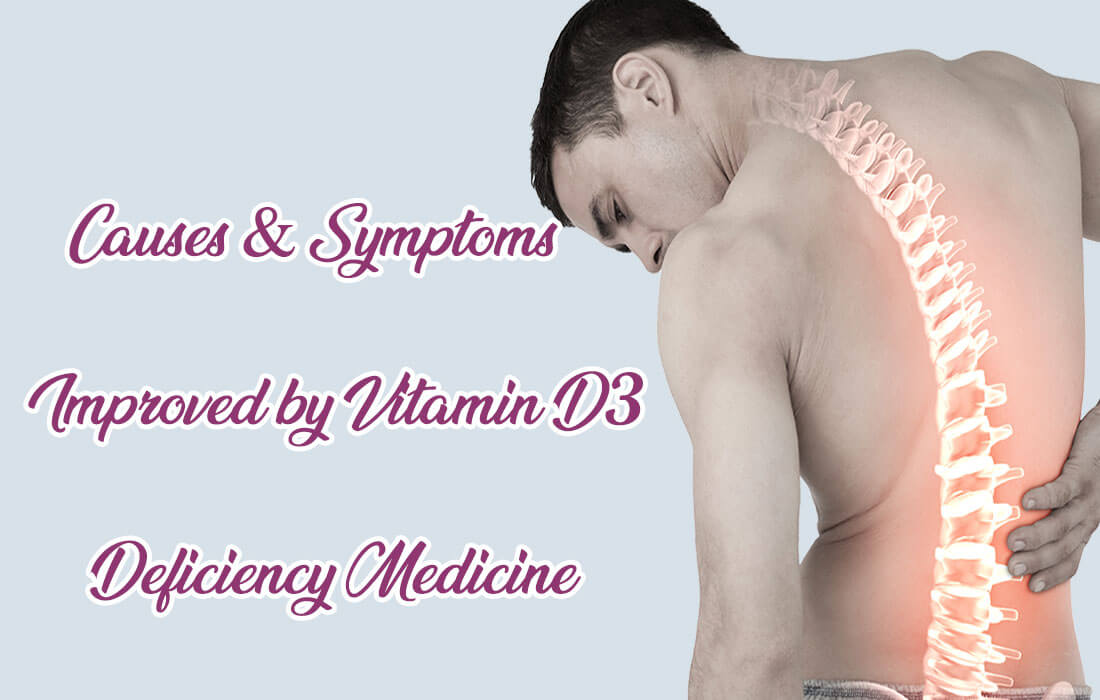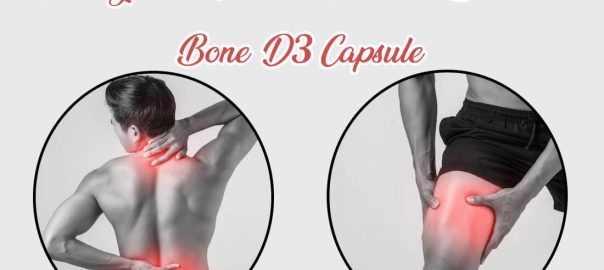
Vitamin D3 is a vital nutrient that our bodies need to function properly. It helps maintain strong bones, regulate mood, and support the immune system. Unfortunately, many people suffer from a deficiency in this essential vitamin without even realizing it. In this informative blog post, gain knowledge about vitamin D3 deficiency, including its causes and symptoms. These signs range from hair loss to depression to muscle weakness, all of which can be easily overlooked. But fret not; we will also provide you with practical solutions and vitamin d3 deficiency medicine to combat this deficiency and boost your vitamin D3 levels. So, keep reading to learn more about how to take care of your body and ensure optimal health.
What is Vitamin D3 Deficiency?
Ensuring bone health is crucial for sustaining a vibrant and active life. Adequate Vitamin D3 in the body is critical for overall bone health. However, sometimes, our body doesn’t get enough Vitamin D3, leading to a deficiency. It can be a serious issue as it weakens our immune system and affects calcium absorption. These medicine for vitamin d3 deficiency help replenish the Vitamin D3 levels in our body, ensuring we maintain optimal bone health. Taking precautions and regularly checking for Vitamin D3 deficiency is crucial to prevent any long-term health complications.
A well-rounded diet that includes all vital nutrients is essential for both strong bones and overall health. Adequate exposure to sunlight is also necessary as it helps synthesize Vitamin D3 in our body. Therefore, spending time outdoors in the sun is advisable, especially in the early morning. Taking precautions, such as increasing the intake of Vitamin D3-rich foods, can go a long way in preventing Vitamin D3 deficiency and maintaining healthy bones and bodies.
Causes of Vitamin D3 Deficiency
Vitamin D3 deficiency, also recognized as hypovitaminosis D, may arise due to various factors, resulting in numerous implications. Vitamin D3 is important for several bodily functions, including calcium absorption in the gut, maintaining bone health, and supporting the immune system.
Here are some common causes indicating Vitamin D3 deficiency:
1. Inadequate Sun Exposure: The most common cause of Vitamin D3 deficiency is insufficient exposure to sunlight. When your skin is exposed to the sun’s UVB rays, it synthesizes Vitamin D. Factors like spending too much time indoors, living in regions with limited sunlight, wearing clothing that covers most of your skin, or using excessive sunscreen can reduce your ability to produce Vitamin D.
2. Dietary Insufficiency: Some people may not get enough Vitamin D3 from their diet. While some people include dietary sources of Vitamin D like fatty fish (salmon, mackerel), egg yolks, and fortified diets like milk and cereals, many need to consume them in adequate quantities.
3. Malabsorption Issues: Conditions like celiac disease, Crohn’s disease, and other gastrointestinal disorders can obstruct Vitamin D absorption in the intestines, causing a deficiency to develop.
4. Obesity: Vitamin D is fat-soluble and has the capacity to accumulate in fat cells. Individuals with obesity might experience enhanced Vitamin D storage in fat tissues, potentially leading to lower circulating levels in the bloodstream.
5. Ageing: As people age, their skin gradually loses its efficiency in producing Vitamin D when exposed to sunlight. Additionally, older individuals may have reduced dietary intake or absorption issues.
6. Kidney and Liver Conditions: Both the kidneys and the liver play a role in converting Vitamin D into its active form. Conditions that affect the function of these organs can lead to Vitamin D deficiency.
Symptoms of Vitamin D3 Deficiency
Vitamin D3 is a crucial dietary addition that ensures both strong bones and a resilient immune system. However, despite their importance, many people suffer from vitamin D3 deficiency. Don’t underestimate the importance of addressing this condition, as it can have enduring and severe implications for your overall health and quality of life. Its deficiency can manifest in various ways, and recognizing the symptoms is important for timely intervention.
Here are common symptoms that may indicate a vitamin D3 deficiency:
1. Fatigue and Weakness: Feeling constantly tired and experiencing a general lack of energy could indicate vitamin D3 deficiency.
2. Bone and Joint Pain: Vitamin D3 is vital in maintaining bone health. Deficiency can lead to bone and joint pain, often associated with conditions like osteoporosis or osteomalacia.
3. Muscle Weakness: Inadequate vitamin D3 levels can result in muscle weakness, making activities that require strength more challenging.
4. Impaired Wound Healing: Vitamin D3 deficiency may slow down the healing process of wounds, leading to delayed recovery and increased susceptibility to infections.
5. Mood Changes: Low levels of vitamin D3 have been connected to mood-related conditions like depression, anxiety, and seasonal affective disorder (SAD).
6. Impaired Immune Function: Vitamin D3 is crucial for a properly functioning immune system. A lack of sufficient nutrients can increase vulnerability to infections, frequent sickness, or prolonged healing.
7. Poor Bone Health: Vitamin D3 is essential for calcium absorption, and a deficiency can contribute to poor bone health, increasing the risk of fractures or osteoporosis.
8. Tooth Sensitivity: Insufficient levels of vitamin D3 can affect the structure and composition of your teeth, leading to increased tooth sensitivity to hot, cold, sweet, or acidic foods and beverages and also weakened tooth enamel, making your teeth more prone to decay and cavities.
It is crucial to take precautions to prevent vitamin D3 deficiency, especially for those who do not receive enough sun exposure or have restricted diets. Taking the best medicine for vitamin d3 deficiency is recommended to supplement your vitamin D3 intake and ensure optimal health. Daily supplement intake can prevent and ease vitamin D3 deficiency symptoms, promoting stronger bones and a healthier immune system.
Being mindful of deficiencies, like vitamin D3, is crucial to proactively manage potential health issues. Symptoms: fatigue, muscle and joint pain, depression, increased infection risk, and susceptibility to autoimmune diseases. By being proactive, individuals can take a preventative approach to their health and mitigate the risks associated with deficiencies.
Tips to Overcoming Vitamin D3 Deficiency
Bone care is essential to maintaining a healthy body, especially as we age. For those with a vitamin D3 deficiency, prioritizing precautions is crucial to maintain good health and prevent adverse outcomes. One can start by getting enough sunlight exposure, as sunlight is the best source of Vitamin D3. Additionally, include vitamin D-rich foods like oily fish, egg yolk, and fortified dairy products in your diet.
For individuals who are unable to get enough Vitamin D through sunlight exposure and diet, taking medicine for vitamin d3 deficiency can be an effective solution. When taken as directed and under a professional’s guidance, these supplements can help improve bone health and strengthen immunity. By following these measures, individuals can take control of their bone health and reduce their risk of developing bone disorders such as osteoporosis. Please don’t wait until it’s too late; start taking steps towards optimal bone health today.
Conclusion:
Vitamin D3 is an essential nutrient that helps our body absorb calcium, which is necessary for maintaining strong bones and teeth. It’s crucial to pay attention to our bodies and take heed of the signs that may indicate a vitamin D3 deficiency. By identifying these causes and symptoms and taking the necessary steps to address them with vitamin d3 deficiency medicine, we can improve our physical health and also experience a boost in our mood and overall well-being. From incorporating vitamin D-rich foods into our diet to getting more sunlight exposure, several practical solutions exist to combat this deficiency. So, let’s prioritize our health and ensure we give our bodies the nutrients they need to thrive.










